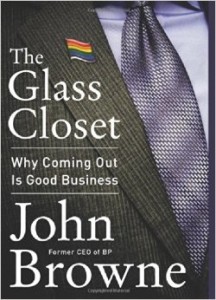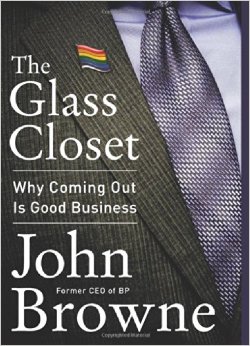 The Glass Closet: Why Coming Out Is Good Business
The Glass Closet: Why Coming Out Is Good Business
by John Browne
Harper Business. 240 pages, $27.99
JOHN BROWNE was the CEO of BP from 1995 to 2007. During his tenure, a harrowing refinery explosion took place in Texas, killing fifteen and injuring 170 workers. While trying to be the face of corporate accountability, Browne was falling apart inside. Tabloids back in England were threatening to out him after a scorned escort spilled the beans about their relationship. Injunctions were filed, Browne resigned his position in anticipation of a firestorm, and the news came out to a flurry of headlines that quickly faded from view.
Having had his life turned upside down by the mere threat of being outed, Browne began to take notice of how few openly gay people there are among the upper ranks of corporations. While recognizing the risks involved, he argues in The Glass Closet that coming out is “good business” because it supports the values of visibility, transparency, and creativity.
There’s much to like in this book, but let me first dispense with a few quibbles. One has the feeling that it was assembled rather hastily as it leapfrogs from memoir to a history of oppressed peoples to a “how to” book for corporations. Its central thesis might have been better presented in a tightly argued article than in a book.
Browne’s thesis is that someone in a position of power who elects to hide a central fact about himself is likely to be perceived as untrustworthy. In contrast, coming out shows a fundamental honesty and a willingness to take risks. It can also pre-emptively shut down offensive comments from coworkers. For example, Browne interviewed a former investment banker whose boss taunted him on a company outing, pointing out a pink bicycle and making rude comments for other employees to laugh at. After leaving the job, the man wished he had come out sooner. “What’s the fun of telling me there’s a pink bike if I’m proud of being gay? It’s only funny because I’m trying to stay in the closet. Coming out kills the joke.”
When Browne was at BP he took pride in his ability to compartmentalize, viewing it as an elite form of multitasking. What he discovered was that the effort involved in hiding his sexuality sapped his creativity. Companies that recruit with diversity in mind often cite the innovations sparked by exposure to other types of people as crucial to getting their best ideas.
Of course, there are still many places in the world where coming out is unsafe, and Browne makes it clear that there are times when it is simply not advisable. His optimism that the global tide is turning in favor of equality is offset by the reality that there is a dangerous countertrend in some parts of the world. That said, among the people he interviews are some who help others manage their coming out processes, and they often find people for whom there will be few serious consequences for stalling until life is indefinably “perfect” before dropping the Q bomb on coworkers. These are the folks to whom Browne is primarily speaking, and his call to action has merit: diversity magnifies diversity and invites more.
This reader opened The Glass Closet prepared to be a bit smug, recalling subsequent BP CEO Tony Hayward’s yawning remark that “I want my life back” while the Gulf filled with oil during the Deepwater Horizon disaster. Would a former BP exec try to cover his company’s oily tracks with a rainbow banner? Thankfully, this did not happen. The Glass Closet is imperfect, but its intent seems authentically benign. There are stories from trans people and bisexuals, which makes this a rare GLBT book that actually touches on everyone in the proverbial quiltbag. While trans people in the lower economic strata risk their lives to be out, Browne shares the story of an executive who faces at worst some ribbing from colleagues. Those in power have much less to risk, and potentially something to gain, by coming out at work.
________________________________________________________
Heather Seggel is a freelance writer on a quest for affordable housing in northern California.






